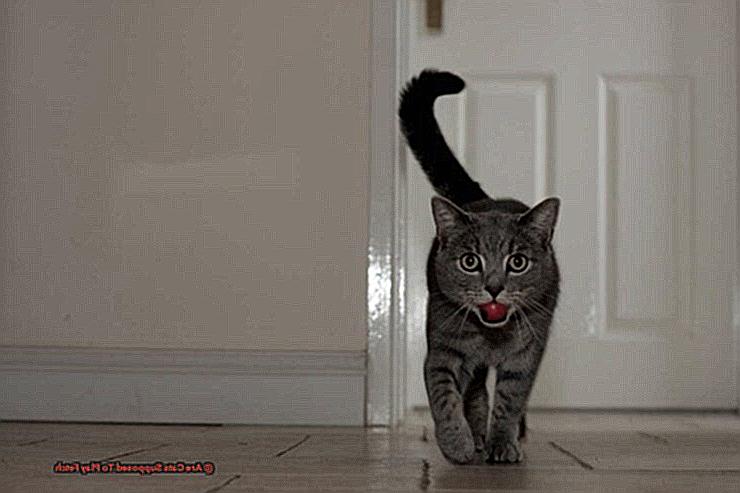We all know that cats have a reputation for being independent and aloof creatures. But here’s something that may surprise you – some cats actually enjoy playing fetch.
That’s right, our feline friends can also get in on the fun of this classic game. But the big question is, do cats have an innate ability to play fetch?
Join me as we take a closer look at the intriguing world of feline behavior and uncover the truth behind their potential for playing fetch.
Let’s explore together.
Are Cats Supposed To Play Fetch?
Contents
Are you tired of hearing that cats are not as playful or trainable as dogs? Well, we have some news for you – many cat owners have reported that their feline companions actually enjoy playing fetch. Yes, you read that right. Contrary to popular belief, cats are capable of learning and playing games, just like their canine counterparts. But before you grab a toy and start throwing it for your cat, let’s dive deeper into this topic and understand if cats are truly meant to play fetch.
The Myth of the Untrainable Cat
We’ve all heard the saying, “You can’t teach an old dog new tricks.” But what about cats? Many people believe that cats are untrainable due to their independent nature. However, that is far from the truth. Cats can learn and perform various behaviors through positive reinforcement and bonding with their owners. Playing fetch is just one example.
Factors That Influence a Cat’s Willingness to Play Fetch
Just like with any behavior, there are factors that can influence whether or not a cat will enjoy playing fetch. These include their personality, breed, age, and environment. Some cats may find the game too tiring or uninteresting, while others may be more than happy to participate.
Certain breeds, such as Bengals and Siamese, are known for their high energy levels and love for playing, making them more likely to engage in fetch.
Kittens may also be more inclined to play this game as they are naturally more curious and energetic. On the other hand, outdoor cats may have learned how to hunt and play with prey, making them less interested in playing fetch.
The Benefits of Playing Fetch for Cats
Playing fetch can have several benefits for cats, both physical and mental. It provides exercise and mental stimulation, which can help prevent obesity and boredom-related behaviors. It also strengthens the bond between the cat and their owner. Plus, for indoor cats who may not have access to outdoor activities, fetch can be a great way to release pent up energy and prevent them from getting bored.
Understanding the Fetch Behavior in Dogs
While playing fetch may seem like a natural behavior for dogs, it’s not as widely accepted or understood when it comes to our feline friends. But can cats actually learn to play fetch? The answer may surprise you.
First, let’s explore the natural instincts of cats and how they differ from dogs when it comes to playing fetch. Unlike dogs who were bred for hunting and retrieving purposes, cats were domesticated for their pest control abilities.
This means that their natural instincts do not include chasing and retrieving objects like prey. Additionally, cats are known for their independent nature and may not have the same desire to please their owners as dogs do.
However, despite these differences, some cats have been known to exhibit fetch behaviors.
This can be attributed to a combination of genetic predisposition and training from their owners. It is believed that certain breeds of cats, such as Siamese and Burmese, are more likely to engage in fetch behavior due to their high intelligence levels and tendency to bond closely with their owners.

Another factor that can influence a cat’s willingness to play fetch is the relationship with their owner. If a cat has a strong bond with their owner and enjoys interactive playtime, they may be more likely to engage in fetch. This emphasizes the importance of building a strong bond with your cat through positive reinforcement and regular playtime.
So, how can you train your cat to play fetch? It may require some patience and consistency, but it is possible. Start by choosing a favorite toy or small object for your cat to retrieve. Encourage them to chase it by tossing it a short distance away.
When they bring it back to you, reward them with treats or praise. Repeat this process consistently until your cat starts to understand the game.
It’s important to note that playing fetch may not come naturally or instinctively to cats, but it can be taught through positive reinforcement training. This type of training is based on rewarding desired behaviors with treats or praise. This method has been proven to be effective in teaching cats new behaviors, including playing fetch.
Do Cats Have the Same Instinct as Dogs?
Cats and dogs, two of the most beloved and popular pets in the world. While they may both be furry and lovable, their instincts and behaviors can be quite different due to their evolutionary backgrounds.
But do cats have the same instincts as dogs, specifically when it comes to hunting and retrieving objects? As an expert on this topic, let’s explore the differences and similarities between these two beloved pets.
Different Evolutionary Backgrounds
Cats and dogs have evolved differently over time, leading to distinct behaviors and instincts. Cats are solitary hunters, meaning they rely on themselves for survival. On the other hand, dogs are pack animals that depend on each other for survival. This difference in social structure may explain why dogs are more trainable and have a stronger desire to please their owners.
Similar Instincts: Hunting
One instinct that cats and dogs share is their natural prey drive. Both animals have a keen sense of sight, hearing, and smell, making them excellent hunters. Cats have a strong instinct to hunt and will engage in play behaviors that mimic hunting, such as chasing and pouncing on toys or objects. This is their way of practicing their hunting skills, even if it’s just for fun.
Different Instincts: Retrieving
While cats may have a natural instinct to hunt, they may not possess the same instinct to retrieve objects as dogs do. Retrieving is a behavior that has been selectively bred into dogs over thousands of years. It stems from their pack mentality and desire to please their owners.
On the other hand, cats do not have a pack mentality and may not see their owners as leaders to please. Therefore, the concept of retrieving an object and bringing it back may not come as naturally to them.
Factors That May Impact a Cat’s Ability to Play Fetch
Although cats may not have the same innate desire to retrieve as dogs do, some factors may influence their ability or desire to play fetch. Certain breeds of cats, such as Abyssinians and Siamese, are known for their high energy levels and intelligence, making them more likely to engage in fetch games. Additionally, cats who have been trained since kittenhood may be more open to learning and playing fetch than those who have not been trained.
Factors That Influence a Cat’s Ability to Play Fetch
Cats are known for their independent nature and their preference for solitary play, so it may come as a surprise to some that they too can engage in the interactive game of fetch. While not all cats may have the same natural inclination towards this activity, there are several factors that can influence their ability to play fetch. Let’s take a closer look at these factors and how they may impact your feline friend’s fetch game.
Personality:
Just like humans, cats have their own unique personalities. Some may be more laid-back and content with lounging around, while others may have a high prey drive and enjoy interactive play. These personality traits can influence a cat’s interest in playing fetch. If your cat is naturally curious and energetic, they may be more likely to engage in this type of game.
Breed:
Different cat breeds have different energy levels and personalities, which can also impact their ability to play fetch. Breeds such as Abyssinians and Bengals are known for their high energy levels and love for interactive play, making them more likely to enjoy playing fetch compared to other breeds.
Age:
As with any physical activity, age can play a role in a cat’s ability to play fetch. Kittens are naturally more playful and curious, making them more likely to engage in this type of game. On the other hand, older cats may not have the same level of agility and interest in playing fetch.
Environment:
A cat’s environment can also influence their willingness to engage in certain activities. If a cat was raised in a household with dogs, they may have picked up on their behavior and be more inclined to play fetch. However, if a cat has never been exposed to this type of game, they may not understand what is expected of them.
Training:
Training and socialization can also play a role in a cat’s ability to play fetch. If a cat has been introduced to this game from a young age and has been positively reinforced, they may be more likely to continue playing fetch as they grow older. However, if a cat has never been taught how to play this game or has had negative experiences with it, they may not be as eager to participate.
How to Teach Your Cat to Play Fetch
Look no further than teaching your cat how to play fetch. While this may seem like a behavior reserved for dogs, some cats can also learn to chase and retrieve objects. Not only is it a great way to engage your cat’s natural instincts, but it can also strengthen the bond between you and your furry companion.
Before diving into the steps of teaching your cat to play fetch, it’s important to understand that not all cats will enjoy this game. Some may show no interest or become stressed by it, and that’s okay. It’s essential to respect your cat’s individual preferences and not force them into playing. Remember, there are many ways to bond with your cat, and fetch is just one of them.
If you’re ready to give it a try, here are some tips to help you teach your cat how to play fetch:
Start with a positive association
Before introducing the concept of fetching, it’s important to build a positive association with the game. Use your cat’s favorite toy or treat and reward them when they show interest in it. This will help them understand that playing fetch is fun and rewarding.
Use a clicker or specific word
To signal to your cat that it’s time to play fetch, use a clicker or a specific word such as “fetch” or “go get it”. This will help them associate the word or sound with the action of fetching.
Start with short distances
Cats are independent creatures and may not instantly take to the idea of fetching. Start by tossing the toy a short distance away and encourage your cat to go after it. Reward them immediately when they pick up the toy.
Make it fun
The key to successfully teaching your cat to play fetch is to make it a fun and positive experience for them. Use treats, praise, and playtime to reinforce their good behavior. If your cat seems disinterested or bored, take a break and try again later.
Be patient and consistent
Some cats may take longer to learn how to play fetch than others, so it’s important to be patient and consistent with your training. Don’t give up if your cat doesn’t catch on right away.
Vary the toys
Once your cat has mastered the basics of fetch, make sure to switch up the type of toys you use. This will keep them interested and engaged in the game.
Remember, playing fetch should not replace other forms of play and exercise for your cat. It’s important to provide opportunities for them to hunt and explore their surroundings. Fetch should be seen as a fun activity rather than a necessary form of exercise.
Potential Benefits of Playing Fetch with Your Cat
Not only is it a fun and entertaining game, but it also has numerous benefits for their mental and physical well-being. As an expert on cat behavior, I have gathered research and personal experiences to showcase why playing fetch should be a part of every indoor cat’s routine.
Mental and Physical Stimulation
Indoor cats can easily become bored without enough mental and physical stimulation, which can lead to destructive behavior. Playing fetch provides an outlet for their energy and keeps their minds engaged. It also helps prevent boredom and destructive behavior, such as scratching furniture or excessive meowing.
Bonding with Your Cat
Cats may have a reputation for being independent creatures, but they also crave attention and love from their owners. Playing fetch with your cat is a great way to strengthen your bond and provide them with positive interaction. They will associate the game with your attention and affection, making it a meaningful and enjoyable activity for both of you.
Exercise and Weight Management
Just like humans, cats need regular exercise to stay healthy. Playing fetch can serve as a form of exercise for cats, especially those who are not able to go outdoors. It allows them to burn off excess energy and maintain a healthy weight. This low-impact activity is also suitable for older or overweight cats who may have joint issues.
Channeling Hunting Instincts
Cats are natural hunters, and playing fetch allows them to tap into their instincts. As they chase and capture the moving toy, they get to experience the thrill of hunting in a safe and controlled environment. This is especially beneficial for indoor cats who may not have the opportunity to hunt in their surroundings.
Improving Coordination and Agility
Playing fetch can also improve your cat’s coordination and agility as they learn to track and catch the moving toy. This is especially beneficial for kittens, as it helps them develop these skills at a young age. It can also be a fun way to challenge and engage adult cats.
Incorporating Variety and Fun
To keep your cat interested and engaged in playing fetch, it’s important to incorporate variety and fun into the game. You can try different types of toys, such as feathers or laser pointers, to keep them entertained. You can also change up the location of the game or add obstacles for an extra challenge.
Signs That Your Cat May Not Enjoy Playing Fetch
Playing fetch with your cat can be a fun and rewarding activity for both you and your furry companion. However, not all cats may enjoy this game as much as others. As a cat behavior expert, I have observed and researched the signs that may indicate your cat is not a fan of playing fetch.
- Lack of interest: If your cat shows little to no interest in playing fetch, it could be a sign that they simply don’t enjoy the game. Cats are known for their independent nature, and if they are not engaged or enthusiastic when you try to play with them, it’s best to respect their boundaries.
- Running away or hiding: Cats are masters at hiding and escaping when they don’t want to do something. If your cat runs away or hides when you try to play fetch with them, it’s a clear indication that they are not interested in the game.
- Aggressive behavior: Some cats may become aggressive or irritated when you try to play fetch with them. This could be a sign that they do not enjoy the game and may see it as a form of annoyance or even a threat. It’s important to pay attention to your cat’s body language and vocalizations during playtime to ensure that they are comfortable and happy.
- Disrupting their routine: Cats are creatures of habit and can become stressed or anxious if their routine is disrupted. If your cat seems agitated or uneasy when you try to introduce a new activity like playing fetch, it could be a sign that they are not comfortable with it.
- Physical limitations: While most cats are agile and athletic, some may have physical limitations due to age or health conditions. If your cat seems hesitant or unable to participate in playing fetch, it could be a sign that they are not physically able to do so comfortably.
- Different forms of play: Just because your cat doesn’t enjoy playing fetch, doesn’t mean they don’t like other forms of play. It’s important to try different games and activities to see what your cat responds to positively. This can help you bond with your cat and provide them with mental and physical stimulation.
Conclusion
In conclusion, while cats may have a reputation for being independent and aloof creatures, it’s important to remember that they are also capable of enjoying interactive games like fetch.
As we’ve seen in this article, there are various factors that can influence a cat’s ability and willingness to play fetch. From their unique personalities and breed tendencies to their age and environment, every cat is different in how they approach playtime.
But don’t let their initial reluctance fool you – playing fetch with your cat can be a rewarding and enjoyable experience for both of you. Not only does it provide mental and physical stimulation for your feline friend, but it also strengthens the bond between you two. By tapping into their natural hunting instincts, playing fetch allows indoor cats to engage in a safe and controlled form of exercise.
While some cats may take to fetch naturally, others may need some patience and positive reinforcement training before fully embracing the game.
It’s crucial to respect your cat’s individual preferences and not force them into playing if they show signs of discomfort or disinterest. Remember, every cat has their own unique personality and preferences when it comes to playtime.






